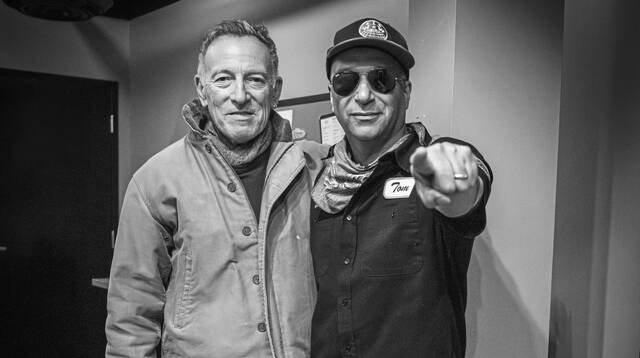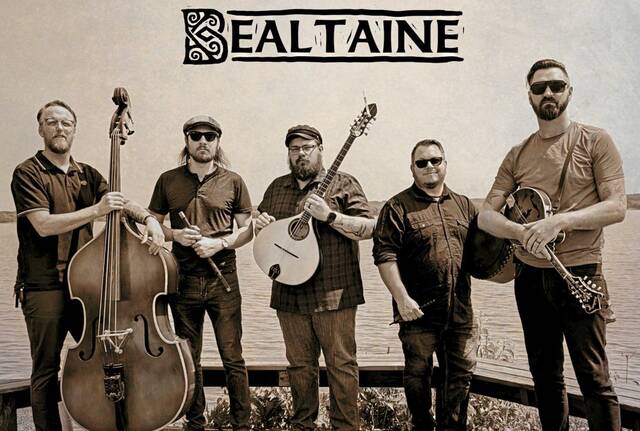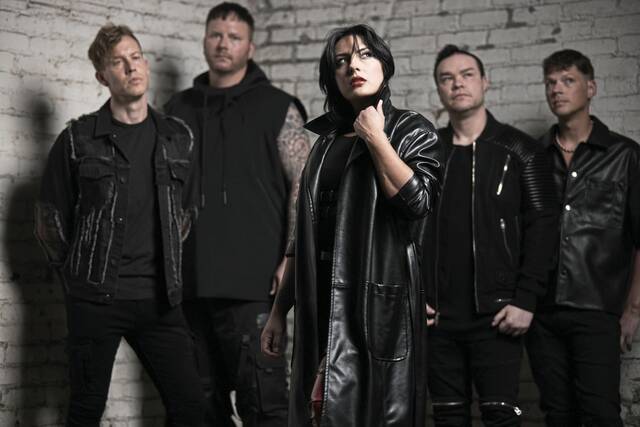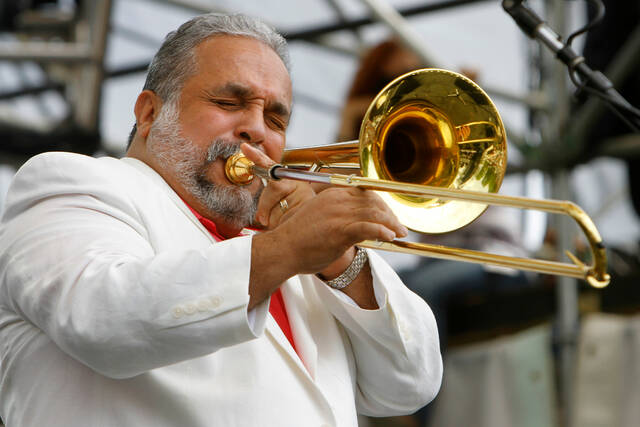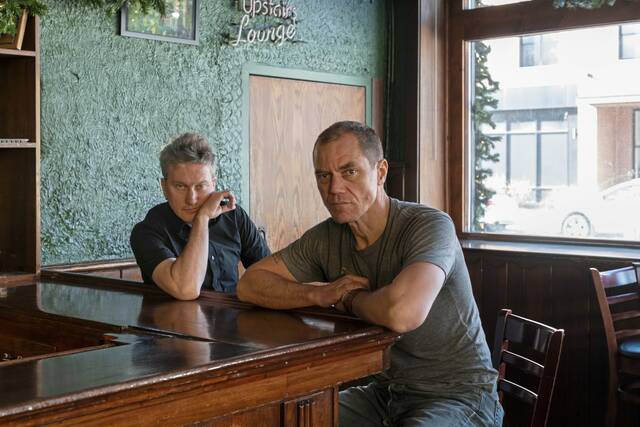It’s been more than three months since Mark Farner’s American Band played a concert, so he’s amped for the next show on his calendar, a June 26 stop at Jergel’s Rhythm Grille in Warrendale.
“When we hit the stage, man, it’s like this big explosion,” said Farner, the original singer/guitarist for Grand Funk Railroad. “It’s an explosion of love.”
Farner co-founded Grand Funk Railroad — known for songs like “I’m Your Captain (Closer to Home),” “We’re an American Band” and a cover of “Some Kind of Wonderful” — in 1969, with the band breaking up and reuniting several times, before Farner left for good in 1998. Legal battles have ensued over the years with drummer Don Brewer and bassist Mel Schacher, but Farner is soldiering on on his own.
“The Grand Funk fans that know me as the songwriter of more than 90% of the original catalog Grand Funk music, and lead singer-songwriter, guitarist, and in the early days, keyboardist, they’re not going to be disappointed because I’m going to be doing a lot of the Grand Funk stuff,” he said. “I’m going to be doing some of my solo stuff. We got some surprises that we like to pull out of the hat every once in a while as well.”
Farner’s latest solo album, “Closer to My Home,” came out last year, with production assistance from Slaughter singer/rhythm guitarist Mark Slaughter. It also includes a new take on “I’m Your Captain (Closer to Home,)” which originally came out in 1970.
In a Tuesday call from his home in Michigan, Farner discussed how the new album came together, the “hidden” scale he plays in, the possibility of a full-fledged Grand Funk Railroad reunion and more:
How did the new album come together with Mark Slaughter?
We were in New York City at Rock ‘n’ Roll Fantasy Camp, David Fishof, his baby. He was the guy who put the whole thing together years and years ago, and I was at his first one in Miami Beach, which was great. I loved it. I loved the idea of it. Being a participant as a counselor or a special guest has always been a treat for me. But I went in as a special guest into New York City, and David came over to me and told me that Howard Stern wanted me to be on his show. He wanted me to come and do “I’m Your Captain.” And I said, how does he want it? Did he want it like me with an acoustic guitar? He says, no, man, take the fantasy band. We had Kip Winger on bass, Sandy Gennaro from Joan Jett & the Blackhearts on drums. We had Teddy Zig Zag from Guns N’ Roses on the keyboard. We had Bruce Kulick from KISS on acoustic, Mark Slaughter on second, me on first, and we went in there and did “I’m Your Captain,” and Howard loved it.
After we did the show and we were in the green room, I started talking with Slaughter and he was telling me that he wanted me to listen to some of the stuff that he had been working on. He sent it to me in an email and I was knocked down because I loved the production of it. The guitars were right where you could hear everything. It was beautiful. So I called him and I told him, hey man, I really like your stuff and whoever’s producing it has definitely got the right idea. He says, that’s me producing it. I said, you’re kidding me, man. So he said, I want to produce you. I would love to produce you and get involved with you on whatever you’re doing, whatever you’re going to do in the future. So that kind of kicked it off. We got together at his studio in Tennessee and just started laying down tracks. But it took two years to put it together because he’s a touring musician and I’m a touring musician. We’re still active in the circuit, so when both of us had time off together, then we’d get together and we’d make some progress on the album.
Finally after two years, we put it all together and very proud to say I’m happy and very satisfied with what Brother Slaughter did. And being that he is Cherokee as well as I am, I mean we both have a tribal sensation when we have our talents come together like that. It is a celebration, and I think it speaks throughout the album. But his idea of making it diverse, he says we need to have something, a little bit of everything that you’re capable of and that you’ve done in the past, but we need to have some new stuff, too. And I think we hit it pretty good.
Was that fun to play that super heavy stuff (like “Same Game”)?
You know, the Grand Funk was known to be the grandfathers of heavy metal. And I think the album, “E Pluribus Funk,” really introduces that aspect of my songwriting. I wrote the entire album, and that is still in me. That’s still part of who I am. It’s not like I’ve evolved out of and I don’t do that stuff anymore. I love doing everything that I’m capable of doing. And especially, being in the business since 1969, man, I’ve got an artillery of songs to dip into.
Did it feel natural to revisit “I’m Your Captain” for this album?
Yeah, and it’s a different take. I mean, we tuned to 432 (hertz), which was the original American tuning standard. It was changed by Rockefeller (Foundation) in 1953 to A440. The 440 hertz is the tuning standard for the United States and most of the world that plays rock and roll anyway. But prior to 440, it was 432. And 432 is part of the Solfeggio scale, which makes it a natural frequency. It blends well with everything in nature, and everything in nature is emitting frequency. And instead of running into a wall, we can run right through the wall with 432. The Solfeggio scale is, wow, it has been hidden for years. But somebody rediscovered it, and I’m so happy that they brought it to light again.
How did that affect the song then?
Let me give you an example: a guy sent me a video of this dude had a kiddie pool on his deck, and he put a 15-inch speaker next to it. He had a tone generator and an amplifier, and he tuned it to 440, which is the current American tuning standard. All the orchestras, all your high school bands, all the rock and rollers, they all tune to 440. So he plays A2, which is a very low note on the scale, and he played it at 125 decibels, and the threshold of pain is 90. So 125 is pretty much screaming. And the kiddie pool was like a storm. There were waves on it. There was foam on it. It was like it had an agitator in a great big washing machine. It was just jumping up and down like it had legs on it.
I’m not kidding. I’m going, wow! That really is a statement right there. There’s a visual for what the sound pressure level can do. But then he tunes it down to 432. He tunes the tone generator to 432. He hits the exact note, but in the original tuning standard for the United States. At 125 decibels, it’s a piece of glass, dude. I’m talking flat. There’s not a quiver. There’s not a ripple. It is absolutely still. That really captured my attention because I had heard some things throughout the years about frequency, and we haven’t been taught about frequency. And I think it’s kind of been kept from the masses, but we have to consider frequency because everything emits a frequency. All the different gemstones emit different frequencies. Nature, the earth, is emitting a frequency.
And for me to tell you that cutting “I’m Your Captain” now in a frequency instead of, you can imagine this, putting a pair of boxing gloves on and going up and beating the crap out of that kiddie pool to get it to agitate and jump up and down and have waves and foam. I mean, it was getting a hit, and visibly you could see the impact it was having on the water. Well, our bodies are more than 70% water, so it kind of spoke to me. And then when they played 432 and nothing happened, I went oh my god. The dude that gave me the link to follow, he said he wanted me to call him. He said he’s a retired Navy SEAL and he lives in San Diego, and he said when you get done watching the link, call me.
So I called him. I said, OK dude, you got my attention. He said, man, if you’ve got an acoustic guitar, I want you to tune it to 432. And so I ran in, I got my Guild, I got an old D-52, a nice, beautiful acoustic guitar, American made, and I tuned it to 432. And dude, I’m telling you what, it’s not louder, but it’s more. The frequencies, the harmonics that come out of those strings now, it’s almost like having a 12-string, because you hear the harmonic that accompanies the string tone, and you’re going, where the hell is that coming from? But it’s there. I played in Washington D.C. a couple of months ago, and the guy, that’s exactly what he said to me. He says, I’m out here in front of your guitar, and I see it’s a six-string, but I swear to God, I’m hearing a 12-string. I said, you’re hearing 432, dude. It’s pretty amazing.
Do you play all the songs that way now?
Oh, yeah. Once I made the switch, brother, I’m not going back. And I could hardly wait for people to hear this version of “I’m Your Captain” on my “Closer to My Home” album because of that. Once I got turned on to it, dude, I’ve been in 432 for almost 20 years. And when I got turned on to it, I was trying to learn. I really like the Crosby, Stills, Nash & Young song “Ohio.” I like that song. So the intro to it, it’s got kind of a funky acoustic guitar lick that introduces it. I start playing it, and I’m tuned to 432. I’m always in 432, and the song comes on, I forgot that I was in 432, and I was expecting, maybe there’s gonna be this 440 and 432, if you’re playing them both at the same time, you’re really gonna notice they’re different.
But I didn’t notice any difference. I went, oh my God, they recorded that song in 432. That’s why when it hits the radio, that’s why when it starts to play, it turns every head. No matter where I have been, if that song starts to play, people, it captures their attention. Not only the frequency, but the heart cry to the parents of those who lost their children that day.
Have they ever talked about that?
No, I have not ever heard them talk about that. But I discovered it by accident and I’m like the detective with that big old spy-glass going ah-ha! (laughs)
Related
• Q&A: Avril Lavigne celebrating pop-punk glory days (and more) in Greatest Hits tour• Dark pop singer Ellise on 'Pretty Evil' album, Pittsburgh connections
• 2025 Pittsburgh area concert calendar
There’s obviously been a lot of legal battles with Grand Funk Railroad over the years. So have you moved on from those? Do you think a full-fledged reunion could ever take place?
Well, I don’t anticipate that since Don Brewer has said in interviews, and people – I didn’t read the interviews – but people, my friends, said, hey man, forget about it. He’s not going to ever put it back together. He’s running the show in the “Fake Funk,” as they call it, my friends. But I have always been open to it, and I have pitched them face-to-face in corporate meetings. I’m thinking, why isn’t your head put in making the most for the corporation? Aren’t you bound to produce the most? And anyways, I’ve been pitching it for 24 years to put the band back together, but it’s heard, and it’s answered with laughter and whatever. It’s OK, though. I have got to the place where I have forgiven those guys. They’re just off their path, and a lot of people get off their path. They’re led by various things, motivation, pursuit of money, pursuit of the fulfillment of their ego. There’s a lot of things that are in play in life. Take your pick. But I have come to the place in my heart where I forgive them. I really do. But I wish that they would have put it back together while we are all still sucking air so that we could give the fans the real Grand Funk, but, I don’t know, they’re against it.
With the song “Anymore,” it seemed like you’ve moved past that and you’ve forgiven them?
That’s right. If you don’t, man, you know that stuff would eat your lunch.
It’s going to feel better not to hold on to those grudges.
Yeah, that’s right, and that’s my power. I’ll do what I want to with it. I’m not going to spend it wasting time on holding something against somebody. I think the world needs love, but love needs to be understood. It’s a one-word definition: forgiveness. That’s what love is, and that ain’t nothing but forgiveness. If you can find that with your wife, you’re gonna have a happy marriage, if you guys find forgiveness. I’ve been married 47 years. I can prove it. (laughs)



